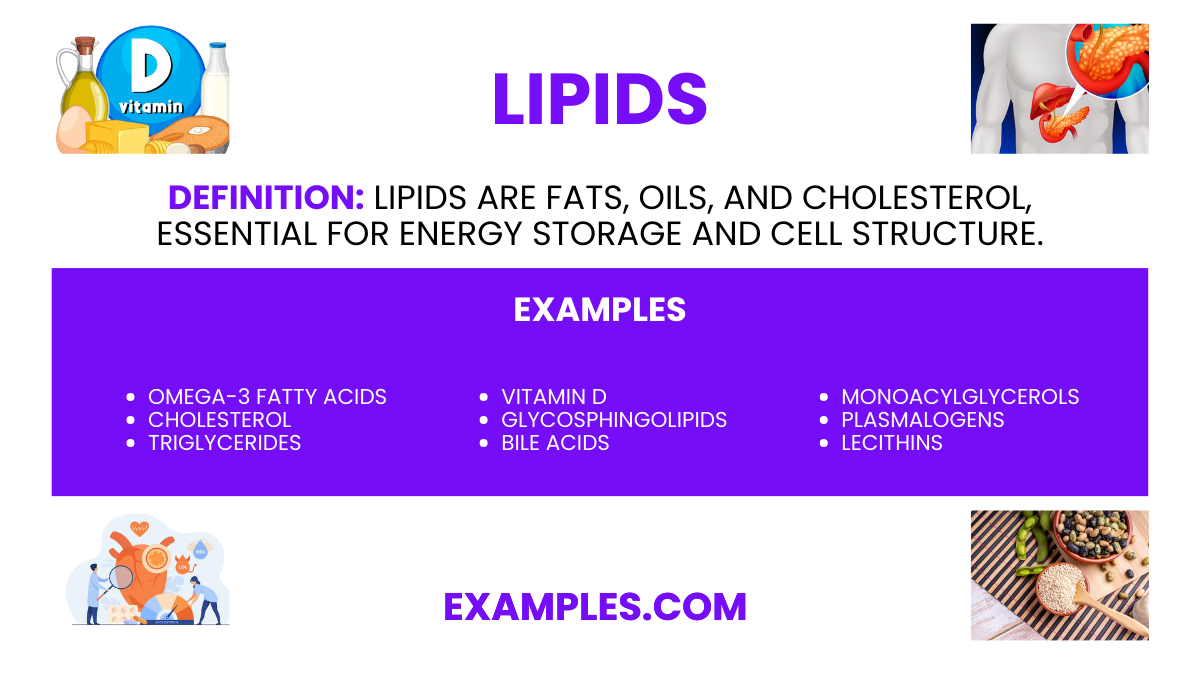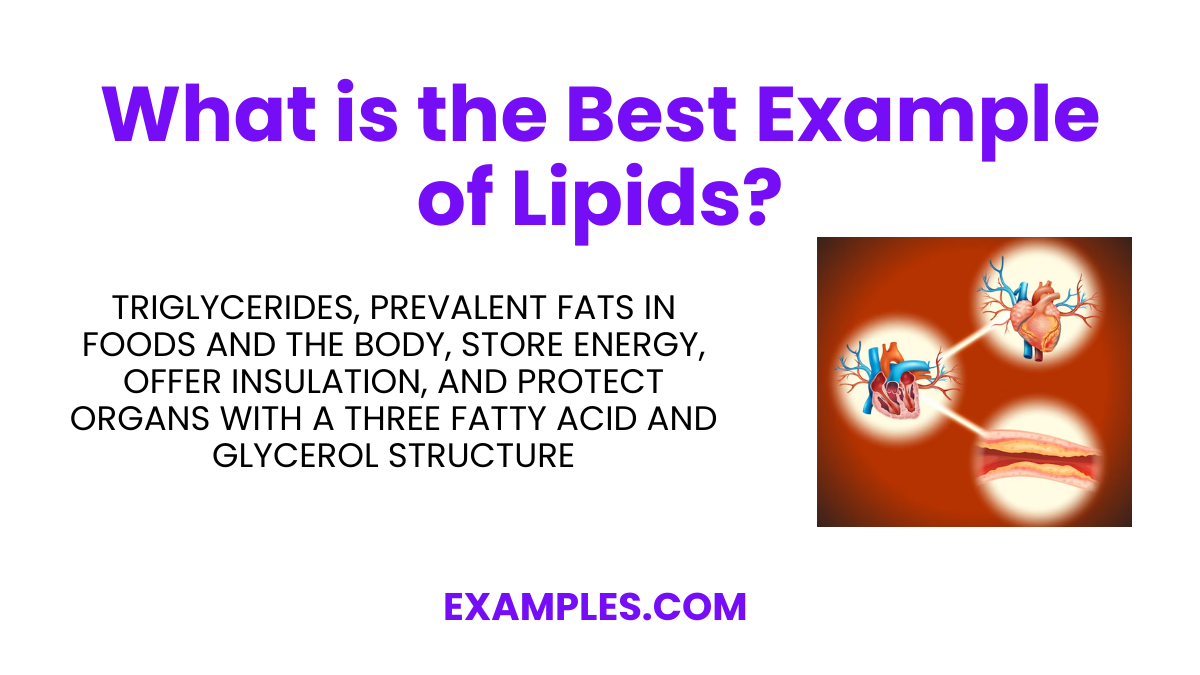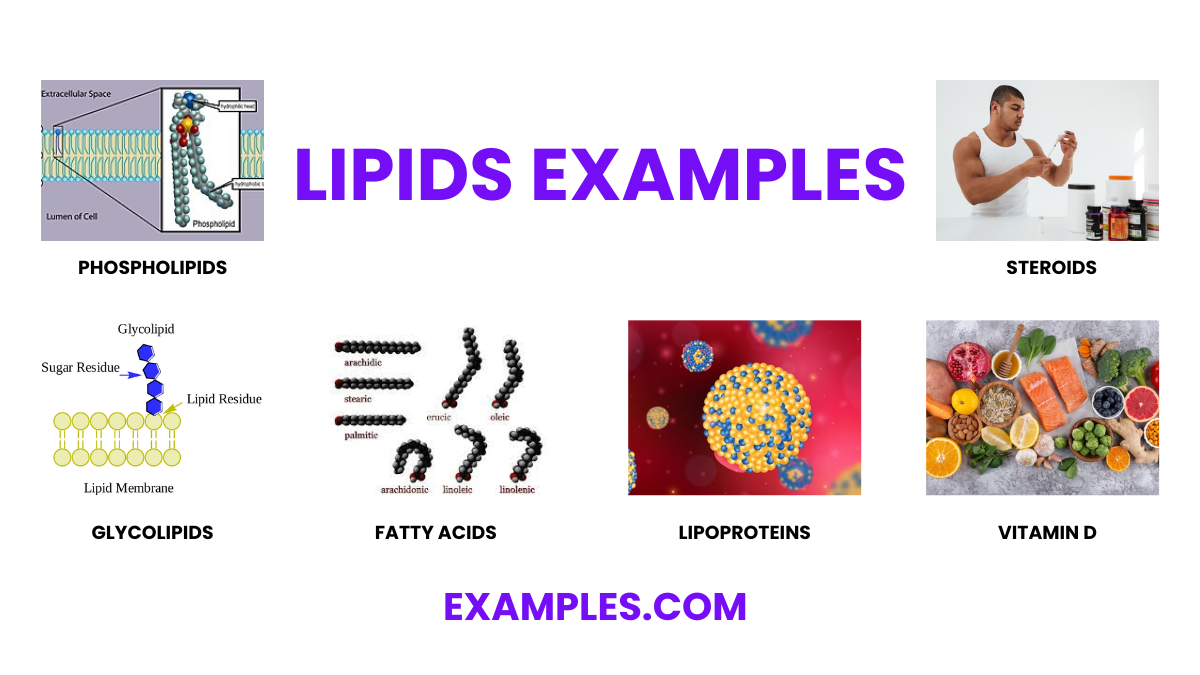Which of the following is a primary function of lipids in the human body?
Transport of oxygen
Structural component of cell membranes
Transmission of nerve impulses
Blood clotting

Lipids are a diverse group of hydrophobic organic molecules essential for energy storage, cell membrane structure, and signaling.When a person consumes carbohydrates or complex carbohydrates, it provides them potential energy through chemical reactions in the body and the absorption of chemical properties in the body. These processes create chemical energy, which if left unused, the body stores the potential energy into fats or lipids.
Lipids are one of the types of compounds one can easily find in the bodies of living entities. These compounds have specific pivotal functions, like regulating temperature and protecting the cell membrane from invaders. Lipids also allow the person to absorb nutrients and act as a storage for unused energy.

The best example of lipids is Triglycerides. Triglycerides are the most common type of fat found in the body and in foods. They are made up of three fatty acid chains attached to a glycerol backbone. This structure is key to their function as major energy storage molecules. When the body requires energy, it breaks down triglycerides, releasing fatty acids that can be metabolized. Triglycerides are also important for insulation and protecting organs.

Lipids, a vital component of all living organisms, play diverse and critical roles in biological systems. This comprehensive list of 20 lipid examples, complete with meanings and uses, is an ideal educational tool for teachers. It provides insights into the different types of lipids and their functions, from energy storage to cell membrane formation. These examples will aid in simplifying complex biological concepts, enhancing students’ understanding of biochemistry and cellular biology.
Lipids, essential components of life, are more than just fats and oils. They are a diverse group of compounds that play critical roles in the structure and function of living cells. Understanding the different types of lipids is crucial for comprehending their biological importance. This guide explores various lipid categories, providing teachers with clear, concise examples to enhance students’ learning experiences. Each type is distinct, contributing uniquely to biological processes and cellular health.
Monoacylglycerols (MAGs) and Diacylglycerols (DAGs) are lipids involved in metabolism and signal transduction. MAGs, with a single fatty acid chain, are key intermediates in the digestion and absorption of dietary fats. DAGs, containing two fatty acid chains, play a pivotal role in cell signaling, acting as secondary messengers in various biochemical pathways.
Cardiolipins are unique phospholipids primarily found in the mitochondrial membranes. They are crucial for the optimal function of several enzymes involved in mitochondrial energy metabolism. Cardiolipins play a significant role in the process of apoptosis, or programmed cell death, highlighting their importance in cellular health and disease prevention.
Cerebrosides are a group of glycosphingolipids important for the structure of cell membranes, particularly in the brain and nervous tissue. They consist of a sphingosine backbone linked to a single sugar molecule, usually glucose or galactose. Cerebrosides are essential for nerve cell function, contributing to the insulation of nerve fibers and signal transmission.
Gangliosides are complex glycosphingolipids with one or more sialic acids attached to their sugar chain. Predominantly located in the neuronal cell membranes, they play critical roles in cell-to-cell recognition, signal transduction, and neurodevelopment. Gangliosides are involved in various cellular processes, including the modulation of cell growth and the immune response.
Polyketides are a large family of secondary metabolites produced by bacteria, fungi, and plants. They have diverse structures and are known for their broad range of biological activities, including antibiotic, antifungal, anticancer, and immunosuppressive properties. Polyketides, such as the antibiotic erythromycin and the antifungal drug amphotericin B, are vital in medicine.
Sterol esters are formed by the esterification of sterols with fatty acids. They serve as storage forms of sterols, including cholesterol in animals. In human cells, sterol esters are stored in lipid droplets and are important for regulating cholesterol levels and maintaining cell membrane integrity.
Lipids, a broad group of naturally occurring molecules, are characterized by their solubility in nonpolar solvents and insolubility in water. Here are eight key characteristics, each described concisely, to help teachers impart the fundamental nature of lipids to students.
Lipids, crucial components of all living organisms, perform various essential functions. This section outlines their primary functions in a clear and concise manner, facilitating an improved understanding among students.
Lipid synthesis is a crucial biological process, involving the creation of complex lipids from simpler molecules. This guide breaks down this process into key steps, providing teachers with a clear, concise way to explain lipid synthesis to students.
Lipids are found in a variety of dietary and biological sources. This section identifies the main sources, aiding teachers in discussions about nutrition and health.
Lipids are composed of specific elements, each playing a vital role in their structure and function. Understanding these elements is key to comprehending how lipids operate within biological systems. This guide simplifies the elements of lipids, offering clear examples to aid teachers in conveying these concepts to students.
Understanding what lipids are made of is fundamental in biology and nutrition. This section breaks down the basic building blocks of lipids, providing a straightforward explanation for educational purposes.
Having too many lipids in the body is bad for the person’s health as it can promote specific health risks that would endanger said person’s life. The amount of cholesterol in a person’s blood can have a cause-and-effect relationship with the person’s current condition. This means that having too much or too little cholesterol in the body can cause health issues to occur, which is a common social issue.
Fats are a type of lipids that one can easily consume when eating meat in one’s meal. Too much consumption of the lipid structure can cause an increase in the number of lipids and cholesterol in the person’s body. Try to reduce one’s consumption of lipids in your diet.
Excess energy one obtains from eating and consuming foods will be transformed and repurposed into fats. Try to burn the excess energy by exercising regularly, even if the exercise lasts for only 30 minutes.
Junk food and oily foods tend to have a high amount of cholesterol than their healthier counterparts. Try to have a healthier diet and eat less junk food and oily foods.
High cholesterol cannot be easily observed during a person’s day-to-day activity unless the condition is severe. The best way to know whether or not a person has high cholesterol is to have monthly check-ups and observations
Lipids are found in the body within cell membranes, stored in adipose tissue for energy, and circulate as cholesterol and triglycerides in the bloodstream.
A lipid is a type of organic molecule that is not soluble in water, including fats, oils, and cholesterol, essential for cell structure and energy.
High lipids in the blood, often referring to elevated cholesterol and triglycerides, can increase the risk of heart disease and stroke
Yes, most steroids are lipids due to their lipid-like structure and their insolubility with water. Not only that, but steroids also produce specific sex and adrenaline-related hormones in the body.Lipids are significantly important parts of the body that help store energy, regulate hormones, and protect the cell membrane. Having too many lipids in one’s body can cause issues that will negatively affect the person’s condition. Therefore it is important to try and reduce the number of lipids a person will have on their body.
Lipids play indispensable roles in the body, from forming cell membranes to storing energy and signaling. Understanding their types and functions is crucial for grasping their biological significance. However, maintaining balanced lipid levels is essential for health, as imbalances can lead to serious conditions. This guide aims to enhance comprehension of lipids, contributing to broader knowledge in biology and health sciences.
Text prompt
Add Tone
10 Examples of Public speaking
20 Examples of Gas lighting
Which of the following is a primary function of lipids in the human body?
Transport of oxygen
Structural component of cell membranes
Transmission of nerve impulses
Blood clotting
What is the most common type of lipid found in the body and food?
Steroids
Phospholipids
Triglycerides
Waxes
Which lipid is known for being a precursor to steroid hormones?
Cholesterol
Phospholipid
Triglyceride
Fatty acid
Which type of lipid is primarily involved in energy storage?
Glycolipids
Steroids
Phospholipids
Triglycerides
Which of the following lipids is amphipathic, meaning it contains both hydrophilic and hydrophobic regions?
Steroids
Triglycerides
Phospholipids
Fatty acids
Which essential fatty acid is necessary for human health but cannot be synthesized by the body?
Stearic acid
Oleic acid
Linoleic acid
Palmitic acid
Which of the following is true about saturated fats?
They have one or more double bonds between carbon atoms.
They are typically liquid at room temperature.
They are usually found in animal products.
They have a kinked structure.
What is the primary characteristic of trans fats?
They contain only single bonds.
They are produced naturally in plants.
They have a double bond in a trans configuration.
They are essential for human health.
Which process is used to convert liquid oils into solid fats?
Esterification
Esterification
Hydrogenation
Hydrolysis
Which of the following lipids is an important component of the myelin sheath in nerve cells?
Triglycerides
Phospholipids
Glycolipids
Sterols
Before you leave, take our quick quiz to enhance your learning!

